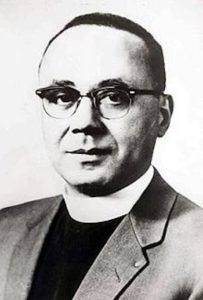
John Burgess
*On this date, in 1909, John Burgess was born. He was a Black bishop.
From Grand Rapids, Michigan, John Melville Burgess’ father was Theodore T. Burgess, a dining car waiter on the Pierre Marquette Railroad. His mother was Ethel I. (Beverly) Burgess. In 1930, he graduated from the University of Michigan and received his master's degree in sociology a year later. He graduated from the Episcopal Theological School in 1934 and returned to begin his ministry in Grand Rapids.
He held honorary degrees from the University of Michigan, Boston College, Assumption College, Suffolk University, the University of Massachusetts, Trinity College, Northeastern University, Bryant College, and St. Augustine's College, Raleigh, N.C., of which he was a trustee. The theme of social service moved throughout Bishop Burgess's career. When he was vicar of the Mission of St. Simon of Cyrene in Woodlawn, Ohio, he directed a community center and day school with his church work. He ministered to the physical as well as spiritual needs of depressed communities.
In 1946 he became chaplain to Episcopal students at Howard University, Washington, and five years later was made a Canon of the Washington Cathedral. He also served as a trustee of St. Paul's College, Lawrenceville, Va., Berkeley Divinity School, Groton School, St. Mark's School, and the Deaconess Hospital. Bishop Burgess served as the past president of the Massachusetts Clerical Association and the Overseas Mission Society vice president. Bishop Burgess first took up ecclesiastical duties in Boston in 1956. Widely recognized for his spiritual, administrative, and intellectual qualifications, he had been serving as Canon of the Washington Cathedral in the nation's capital when he was chosen for the dual role of the archdeacon of Boston and superintendent of the Episcopal Mission.
Burgess was the first Black archdeacon in New England. He was also an official delegate to the Third Assembly of the World Council of Churches that met in New Delhi, India, in 1961. In addition, he was an early proponent of the ordination of women as priests. He married Esther (Taylor); they had two daughters, Julia Burgess of Washington, D.C., and Margaret Harrison of Boston; three grandchildren and two great-grandchildren. In 1962, he was consecrated as a bishop in Trinity Church in Copley Square, becoming the first Black to serve as an Episcopal bishop of a white congregation.
In the summer of 1969, he was elected bishop of Massachusetts and served the state, then the largest Episcopalian diocese in the nation, until 1976. During this time (in 1975), Bishop Burgess was made chairman of the Black Ecumenical Commission, a five-pronged statewide mission for the Black church in Massachusetts. He also was a member of the Boards of Directors of the National Council of Churches, the Massachusetts Civil Liberties Union, The Church Society for College Work, the Church Pension Fund, the National Executive Council of the Episcopal Church, the Massachusetts Advisory Committee to the US Commission on Civil Rights, and the Boston Committee on Foreign Relations. In 1977, he became a professor of ministry at Yale University's Divinity School.
Bishop Burgess felt strongly that the choice of bishops and parish priests in the Anglican community should be made solely on their qualifications and not on race. “If the church is to speak to the world, it must speak in terms of equality after setting an example of the quality on its own.” John Burgess died in August 2003.
An Encyclopedia of African American Christian Heritage
by Marvin Andrew McMickle
Judson Press, Copyright 2002
ISBN 0-817014-02-0